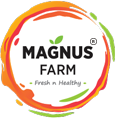The choices that we make about what we put on our plates are more important than ever. Understanding what differentiates these options can help you make informed choices that benefit your health and the environment.
What is organic farming?
In organic farming, produce is grown and processed without synthetic chemicals. No pesticides, growth regulators, synthetic fertilisers, additives, genetically modified organisms, or artificial livestock feed are used. The practices include natural methods like composting, crop rotation, and using green manure to produce nutrient-rich food sustainably.
What is conventional farming?
In conventional farming, produce is grown using various synthetic chemicals, including pesticides, fertilizers, growth regulators, and GMOs. These practices are designed to enhance crop yield and protect against pests and diseases, but often involve significant chemical intervention.
Which one is safe for consumption?
Both organic and conventional produce are considered safe for consumption and are subject to strict regulatory checks to ensure safety. However, many people prefer organic produce to avoid potential chemical residues from pesticides and other synthetic inputs used in conventional farming. While conventional foods contain chemical residues, regulatory bodies ensure that these levels remain within safe limits.
What is the impact on the environment?
| Organic Farming | Conventional Farming |
| Less chances of contaminated soil & water as there is no use of synthetic fertilisers & chemicals. | Extensive use of synthetic fertilisers and pesticides can degrade soil and pollute water. |
| Crop rotation, cover crops, and organic fertilisers increase biodiversity. | Monoculture is common in conventional farming. It depletes soil nutrients and destroys biodiversity. |
| Reduces soil erosion and uses natural composting techniques to increase soil health, fertility, and structure. | Heavy use of chemical inputs and aggressive tillage practices leads to soil erosion, loss of organic matter and reduced soil fertility |
| Often, they consume fewer fossil fuels since they do not rely on synthetic chemicals, which require energy-intensive manufacturing procedures. | Higher carbon footprint due to the production and transportation of chemicals, and the increased use of machinery and irrigation systems. |
Making Informed Choices- Food Safety Tips:
Whether your decision is to opt out of conventional produce and switch to organic or you want a mixture of both, food safety tips remain the same!
- Wash food thoroughly
- Avoid Cross-contamination
- Choose a variety
- Select in-season produce
- Read food labels carefully
- Proper storage
By understanding the differences between organic and conventional farming and considering the environmental and health impacts of each, you can make more informed choices about what you eat. Whether you prefer organic, conventional, or a mix of both, the key is to stay informed and prioritise food safety in your daily diet.
Author Details

Shraddha Parakh,
Quality Executive, Magnus Farms

